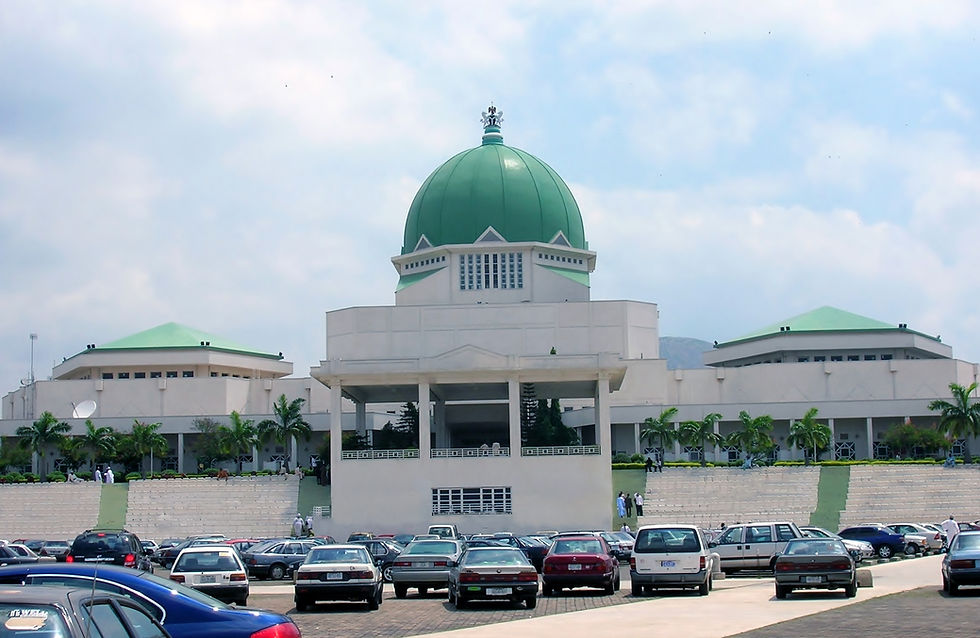New accreditation rules threaten Nigeria's press freedom
- Tebogo Gantsa
- May 22, 2019
- 3 min read

National Assembly, Nigeria. Pics: Creative Commons
Nigerian media houses can breathe a sigh of relief as the newly-issued, highly controversial accreditation guidelines for journalists covering the National Assembly stand to be withdrawn. The president of the Nigerian Senate, Bukola Saraki, has publically distanced his office from the new regulations, issued on May 20 2019, which have since received widespread criticism for their restrictive nature.
According to the Committee to Protect Journalists, the director of the country’s National Assembly, Emmanuel Rawlings Agada, has announced that the guidelines for accreditation to cover the assembly’s proceedings are now under review.
A bureau of at least five staff members in Nigeria’s capital city of Abuja is now among the requirements for print and online media houses who want to apply for permanent accreditation to cover the National Assembly. Print publications must have a daily circulation in excess of 40 000, and online media must be able to prove a viewership of at least 5 000 people per day before the application will be considered.

Bukola Saraki, President of the Nigerian Senate. Pic: @bukuola.saraki (Facebook)
The Nigerian National Assembly has two chambers, namely the Senate, headed by Bukola Saraki, and the House of Representatives. According to a statement released by Bukora’s social media aide, Olu Onemola, the accreditation guidelines did not emanate from the National Assembly.
“The leadership of the 8th National Assembly believes strongly in the freedom of the press and in carrying the Nigerian public along. Hence, the Senate President and all his colleagues will continue to work to ensure that these freedoms remain unhindered,” Bukola said in the statement.
Widespread criticism of new guidelines
The Socio-Economic Rights and Accountability Project (SERAP) has threatened legal action if the guidelines are not withdrawn by May 24 2019. SERAP said the accreditation guidelines were designed to be a barrier to transparency and accountability. The deputy director of SAREP, Kolawole Oluwadare, said the Senate President and the Speaker of the House of Representatives, Yakubu Dogara, must allow journalists to cover the activities of the National Assembly freely.
“The accreditation guidelines clearly run counter to constitutional provisions and Nigeria’s international human rights obligations and the notion of free marketplace of ideas, necessary to serve the best interests of the public,” Kolawole Oluwadare said.
In a statement, the Nigerian Guild of Editors rejected the guidelines as a “clear affront on the letter and spirit of the Nigerian constitution”. The Guild said the Nigerian Constitution empowers journalists to do their work professionally, without allowing for the media to be muzzled. Through its General Secretary, Mary Atolagbe, the Guild urged media organisations to reject what they see as an attack on press freedom and freedom of expression, using structures and policies that run contrary to the fundamental rights outlined in the African Charter and on the people of Nigeria’s right to information.
“The Guild urges all media houses across the nation to rise up and reject this medieval intrusion into the media space in the 21st century, much more in a democracy which Nigerian media doggedly fought for and for which some journalists paid the supreme price.”
The Nigeria Union of Journalists had more scathing criticism for the guidelines referring to them as “satanic”, while Nigeria’s Guild of Corporate Online Publishers has also added its voice to those opposing the controversial guidelines.
More obstacles for Nigerian press
But this new accreditation process is not the only hurdle Nigerian journalists need to jump to do their jobs. Media organisations must now also battle for access to the country’s public representatives after a directive barring all state functionaries from giving interviews without permission from the state governor was issued in the south-east state of Akwa Ibom earlier in May. This means that State Governor Udom Emmanuel has the final say in who can speak to the media, a function his government claims is to help streamline information and ensure a coordinated approach to the dissemination and management of information.
Among those who have effectively been barred from granting interviews in Akwa Ibom are commissioners, special advisers and members of boards and commissions. Only the Akwa Ibom Commissioner for Information and Strategy and the Chief Press Secretary to the Governor are exempt from this directive.
The Committee to Protect Journalists’ Angela Quintal has emphasised that Nigeria must not allow future legislation and guidelines that threaten media freedom or block access to information. "Nigerian authorities should ensure that accreditation requirements to access and report on the National Assembly are open to a diverse range of media," she said. “Journalists must be permitted to report on the legislature without undue hindrance. Nigerian citizens have a right to access information from such an important institution."





Comments